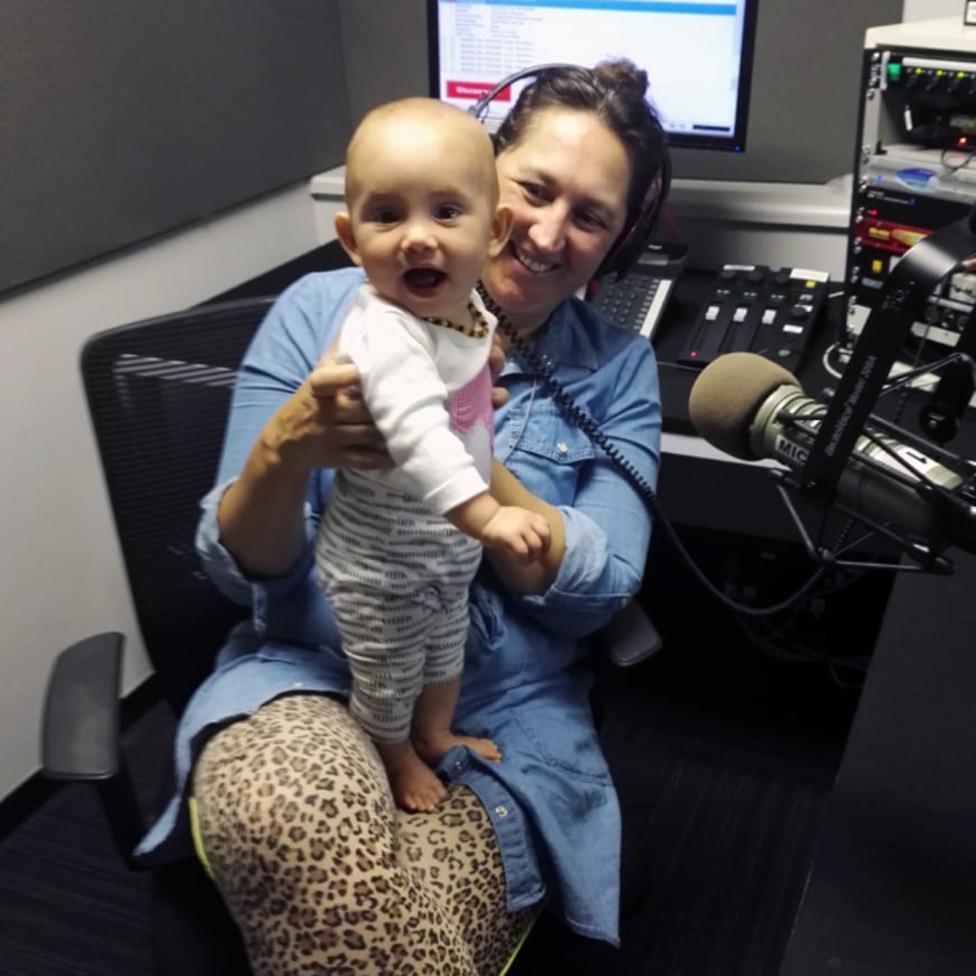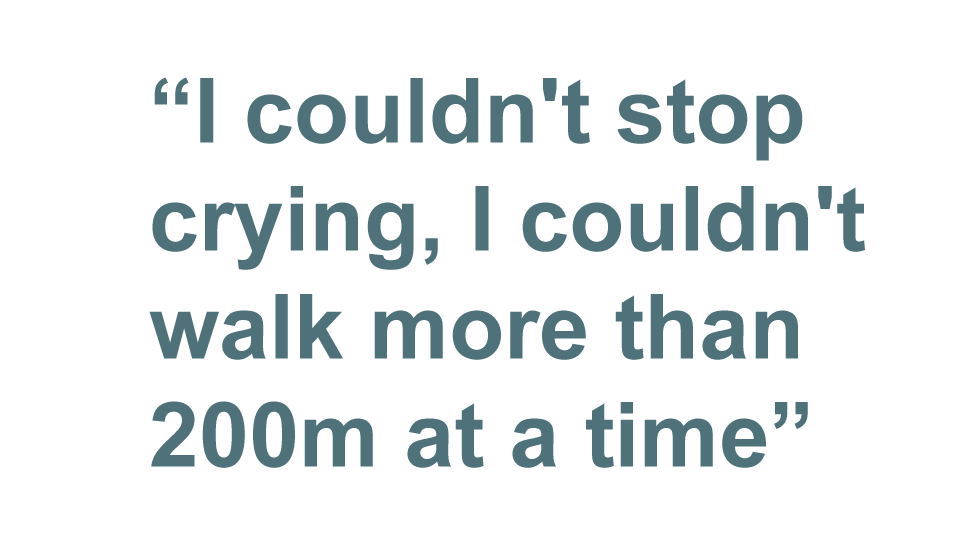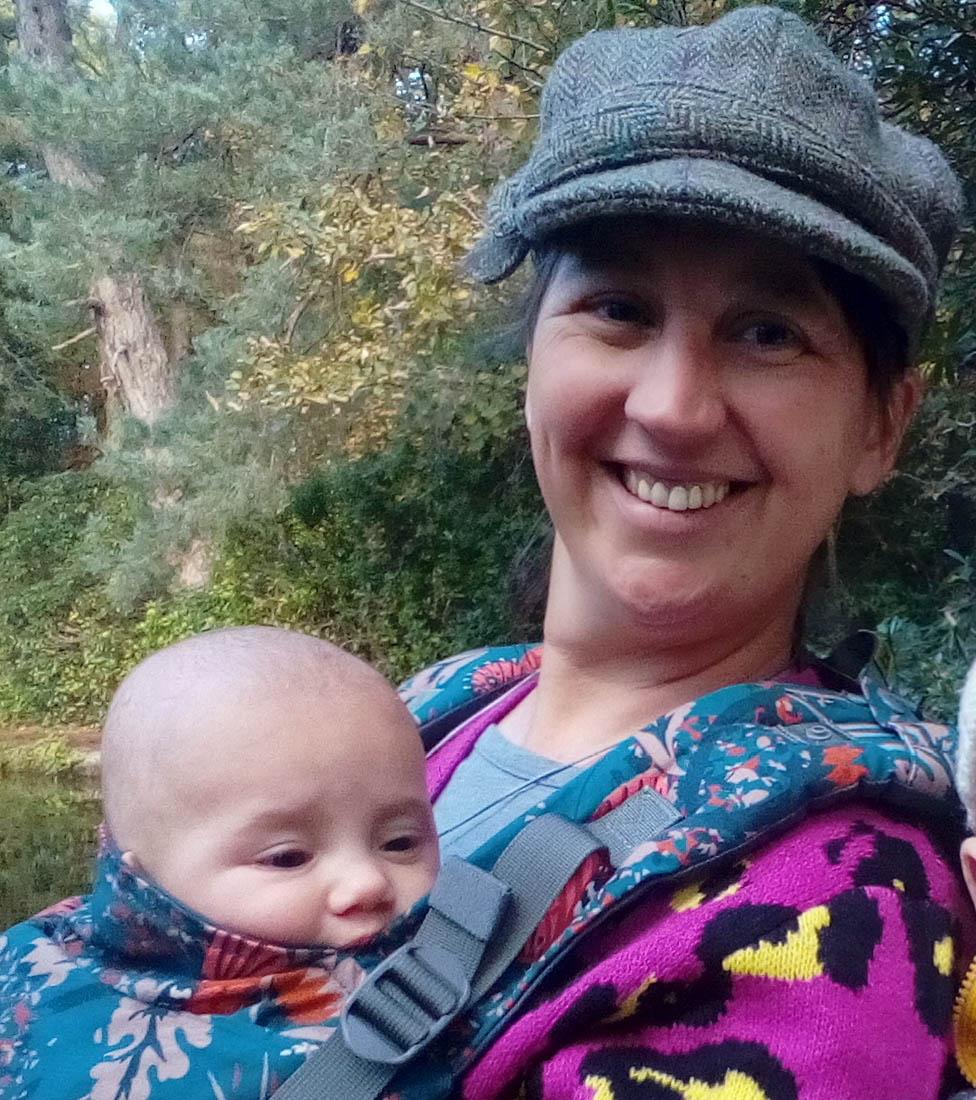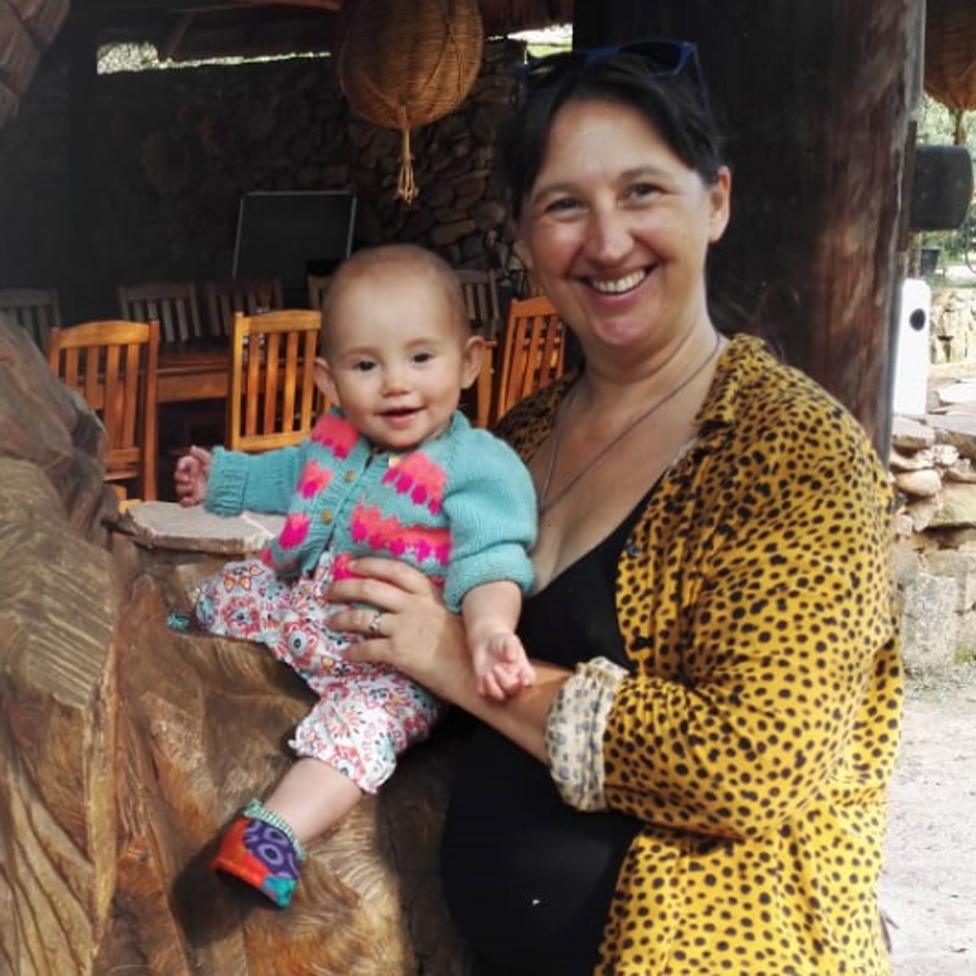'I nearly aborted my baby because of an unreliable test'
- Published


When Claire Bell became pregnant she paid for a test that would indicate whether the baby had Down's Syndrome - and agreed to be screened for some other rare conditions at the same time. Not long afterwards, writes the BBC's Charlotte Hayward, she received what appeared to be terrible news.
For five years, Claire Bell's husband was treated for two types of cancer. When it finally came to an end the couple decided to try having a baby through IVF, using some sperm her husband had had frozen and stored before he had chemotherapy. On the first round, at the age of 41, she became pregnant - and felt incredibly lucky.
"It was this miraculous pregnancy," she says. "It had worked with the first embryo."
The couple decided that they wanted to know if there was a chance that the baby had Down's Syndrome and privately paid for a blood test known as NIPT - a non-invasive prenatal test - which examines the DNA of tiny particles of the placenta circulating in the mother's blood.
"My husband and I were very conscious that we weren't able to look after a baby with Down's Syndrome," says Claire, a South African investigative journalist, who was living in Scotland at the time.
"We just felt we didn't have the emotional reserves, after dealing with five years of cancer treatment."
She signed up for the test at a private IVF clinic. As she did so, the clinician asked her if she wanted to tick a box which meant that the placenta DNA would also be tested for other rare chromosomal conditions.
"They said to me, 'Well if you don't tick it then we can't tell you the gender of the child.' I didn't want to know the gender but my husband did, so I thought, 'All right then.'

"At that point I thought, 'Is the onus on me to ask more questions about that box?' But I was a pregnant mum in a vulnerable state - I wasn't acting like I normally would. Really, they should have told me what that box was about." (In a statement, the clinic Claire went to says its patients are "explicitly counselled on the use of the test and possible outcomes" and that they are given a full explanation of the conditions NIPT may detect - as well as an explanation of the test's limitations.)
The clinic told Claire that she'd get an email if everything was OK, but they'd ring if there was something to discuss.
Just over a week later, while Claire and her husband were on holiday in France, the phone rang. Claire was in the shower at the time, and hurried out to answer the call.
"I ran towards this phone… and while I was standing there, shivering in a towel, the doctor told me that my baby had a chance of having Turner Syndrome."
Turner syndrome is a chromosomal condition that only affects girls. There are a number of potential symptoms, including being short and having fertility problems.
But the information Claire was sent by the clinic painted a very grim picture of life for people with Turner Syndrome. It also talked about the test's reliability.
"I just remember thinking this is science, this is fact… I couldn't stop crying, I couldn't walk more than 200m at a time, I just felt hopeless."
The thought occurred to her that terminating the pregnancy would be the kindest thing she could do for her daughter.
But later in the day, Claire spoke to a friend who encouraged her to find out more about the test. And when she did, she found that her result might not be as troubling as it seemed.

Find out more
Listen to Charlotte Hayward's report into NIPT on the Today programme on Friday 8 February, or catch up later on iPlayer

NIPT has been available privately in the UK since 2012 and is available to any woman or couple who want to pay the bill of up to £500. It's mainly used to screen for Down's Syndrome and two other chromosomal anomalies, Edwards Syndrome and Patau Syndrome. Medical professionals agree that, when used correctly, it is pretty reliable as a test for these conditions.
NIPT for Down's, Edwards and Patau syndromes has recently become available to pregnant women on the NHS in Wales who are considered to be in the higher chance category, and it has been promised to women in England in the same category in the near future.
But when testing for other rarer conditions NIPT hasn't been subjected to rigorous clinical analysis. An article in the medical journal Ultrasound in Obstetrics and Gynaecology argues that when NIPT is used to screen for these conditions, including Turner syndrome (when a girl has only one copy of the X chromosome) or Klinefelter syndrome (when a boy has two copies of the X chromosome and one Y chromosome) it has "a high failure rate" - a low detection rate and a high false positive rate.
One of the authors of that report, Kypros Nicolaides, professor of foetal medicine at King's College Hospital, says that women who have received a disturbing NIPT result in a private clinic often fall back on the NHS for help.
"There is an ideology in the private sector that the more the better," he says.
"In the NIPT test they offer a whole range of conditions that they test for, for which we have no data about how effective and how worthwhile the method of screening is. There are many women that are having expanded tests, they come, they are extremely worried, they have an the invasive test which is what they wanted to avoid, and it shows that the result of the NIPT test is wrong."

Who is regulating?
In response to the increasing availability of the NIPT test, England's Care Quality Commission started carrying out inspections of clinics and hospitals in England - Health Improvement Scotland has also said it currently regulates two services which offer pre-natal testing
In a statement, the CQC says: "We expect providers of NIPTs to ensure that women fully understand the procedure, know that it is not a diagnostic test, are informed about the possible outcomes, and that appropriate support is made available when delivering the test results. This includes facilitating access to counselling and other relevant services as well as medical follow-up where this is needed. Last year we began our planned programme of diagnostic and imaging service inspections and services, which includes those independent providers offering NIPTs"
The Nuffield Council on Bioethics has outlined a number of areas where it has concerns, external, including: misleading use of statistics; poor information about the conditions being tested for; the use of NIPT to test for conditions where the accuracy of the test is low or unknown; lack of pre-test counselling and follow-up support

The invasive test Kypros Nicolaides is referring to either involves a placenta biopsy, or amniocentesis - sampling of the fluid in the amniotic sac - both of which carry a small risk of miscarriage.
Claire Bell did not have an invasive test, because the more she read about the NIPT test as a method of screening for Turner Syndrome the more sceptical she became.
She read on the internet about women whose babies had been judged to be at high risk of Turner Syndrome but who had turned out not to have it. She also read about one woman whose doctor had told her the test was so unreliable you might as well flip a coin.
Then she read that the positive predictive value (PPV) of the test for Turner Syndrome - the proportion of positive results that are indeed true positives - could be as low as 40% for a 41-year-old woman.
She called back the doctor who had told her about her result on the phone and asked if this could be correct.
"Yes, but we don't know," he said.
Still at a loss about what to do for the best, Claire called her aunt. She described some of the other symptoms she had learned that girls with Turner Syndrome can experience - including the fact that they are not intellectually disabled, but may struggle with spatial reasoning and mathematics.
"You can't terminate a baby because she might be short, flat-chested and can't do maths," her aunt said. "And besides, we are from strong Yorkshire stock. You know that. Don't let them stick a needle into you."

Claire and her daughter Fintry

Slipping into journalist mode, Claire talked to the laboratory that tested her blood and asked how often they followed up to find out whether a baby given a test result indicating a high risk of Turner Syndrome actually turned out to have it. The answer was, they didn't do this.
The scientist she spoke to at the lab noted that she didn't seem to have been given the recommended pre-test counselling, so she rang her clinic to ask why this was.
Her doctor replied that in the US she would have been given four hours of counselling before the test but that in the UK there weren't enough genetic counsellors.
(The clinic Claire attended says patients are given advice and counselling on the false positive statistics for the test. It adds that it "informs patients of all test results in a secure, sensitive and supportive manner" and that while it does not provide specific genetic counselling, it supports patients in collaboration with a consultant obstetrician on aftercare and referral pathways.)
Continuing to dig, and reading articles in medical journals, she was astonished to find that the very company that invented the test had itself suggested that it may not be appropriate for general prenatal screening for conditions such as Turner Syndrome. Instead, it said, it "may be best utilised" in cases where there was a family history of a similar chromosomal anomaly, or where an ultrasound scan had given reason to suppose that such an anomaly could be present.


"The thought that I could have terminated this pregnancy, that it crossed my mind to terminate, that is…" she says, pausing to find the right words. "It's just so important that women know that this test has too many false positives."
In June 2018 Claire's daughter, Fintry, was born. She is small, but there are short genes in the family. She shows no symptoms of Turner Syndrome.
Claire will take Fintry for a blood test after her first birthday to find out if she does have the condition, but not before.
"I wanted her to be a whole person in my mind, for me to know her totally before she gets a condition attached to her," Claire says.
"She is healthy, beautiful and full of smiles."
In its statement, the clinic says it "supports best evidence-based practice for all patients, and believes that it continues to operate ethically, professionally and in the best interest of the patient".
It adds: "We will continue to work to professional standards while enabling men and women the right to choose."

What should I think if my NIPT says "Turner"?
Analysis by Robert Cuffe, BBC News head of statistics
If a condition is very rare, the majority of positive screening tests are health scares, and so the technical accuracy rates are misleading.
A test result can sound like a near certain diagnosis when the test says it's 95% accurate. But in many cases, it is still most likely that your child is perfectly fine.
"Ninety-five per cent accurate" means something to regulators and statisticians, but doesn't tell you the chance that your positive result will lead to a diagnosis.
It means, for example, that five out of every 100 healthy people tested will get a health scare: a false positive. But if it's a rare condition - say less than one-in-100 - then most of the positive test results will be health scares.
Medical professionals agree that for Down's Syndrome and some other conditions, the technical accuracy of the test is the right level to give helpful guidance. But that isn't the case for rarer conditions like Turner Syndrome.
So ask your doctor before making any big decisions and, if you are tempted to ask Dr Google, look for how common the condition is before jumping to any conclusions.

Join the conversation - find us on Facebook, external, Instagram, external, Snapchat , externaland Twitter, external.